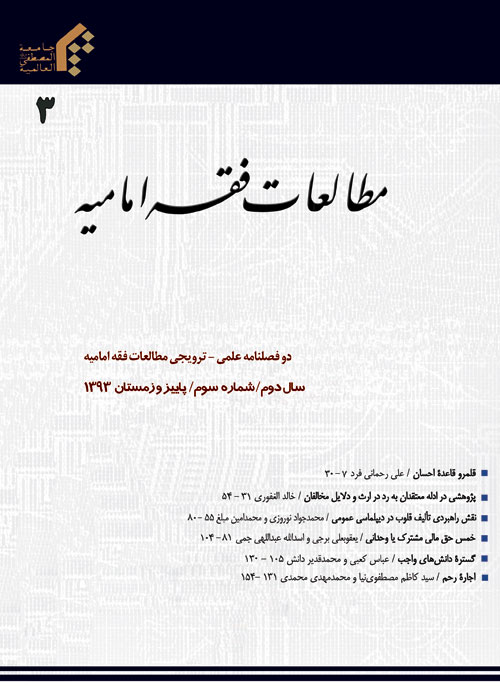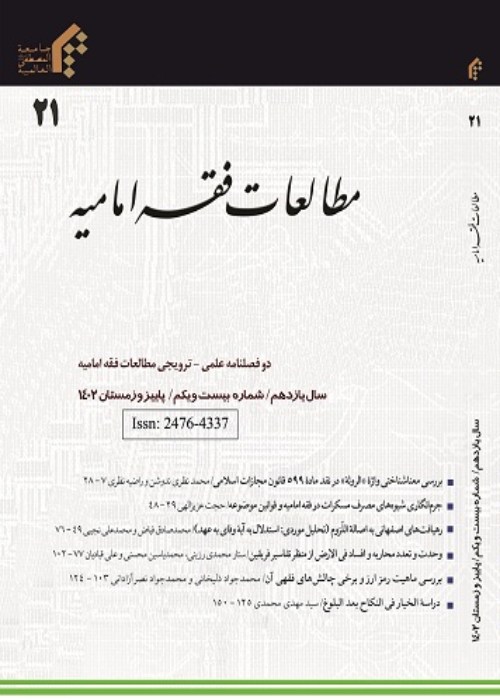فهرست مطالب

مجله مطالعات فقه امامیه
پیاپی 3 (پاییز و زمستان 1393)
- تاریخ انتشار: 1393/11/20
- تعداد عناوین: 6
-
-
صفحات 5-28قاعده احسان در ابعاد اجتماعی، سیاسی، اخلاقی، نظامی و مالی... کاربرد ویژه ای دارد و منشا آثار عجیبی در ابعاد مذکور است، ولی این مقاله معطوف به بعد کاربردی قاعده در ضمان مالی و عدم آن است. بر این اساس، نوشتار حاضر در صدد است با استنتاج از ادله لفظیه و عقلاییه و سیره عرفیه و وجدان و فطرت، قلمرو احسان را در نفی ضمان و یا اثبات ضمان تعمیم دهد و به وجه ضعیف نظریات بعضی از فقها که قائل به اختصاص به مورد جلب منفعت و یا دفع مضرت و یا موارد ترتب غرض ضروری و لازم بر عمل محسنانه و یا اشتراط جریان قاعده به مسبوقیت قاعده احسان به اسائه است اشاره نماید و جریان قاعده را در همه موارد فوق تصحیح کند.کلیدواژگان: عمومیت احسان، جلب نفع، دفع مضرت، غرض ضروری، مباح
-
صفحات 29-52جهت گیری در برابر اموال زائد بر فروض در ارث، یکی از مسائلی است که در دیدگاه مدرسه امامیه و مدرسه اهل سنت در آن اختلاف دارند. پژوهش حاضر به بررسی دلایل و مستندات مربوط به معتقدان به رد در ارث و مخالفان آن می پردازد. نتیجه به دست آمده از این مقاله نظریه ای را تایید می کند که معتقد به بازگرداندن مابقی ارث به ذوی الفروض نسبی به غیر از زوج و زوجه است.کلیدواژگان: ارث، رد (بازگرداندن)، عصبه، فروض، خویشاوندان (ذو الارحام)
-
صفحات 53-78تالیف قلوب مفهومی است برگرفته از یک فرع فقهی در بحث اصناف مستحقان زکات در فقه اسلامی که ریشه قرآنی دارد. کار ویژه «تالیف قلوب» دلجویی از برخی مشرکان و یا منافقان و حتی گروه های خاص از مسلمانان است که به منظور جلب همکاری سیاسی آنان با نظام و امت اسلامی و یا دست کم برای جلوگیری از برخی توطئه ها و تهدیدات علیه امت و نظام اسلامی و یا جهت دعوتشان به اسلام به کار گرفته می شود. یکی از راهبردهای اساسی اقتدار سیاسی در اسلام، ایجاد پیوند معنوی مراد و مریدی و الفت بین شهریاران و شهروندان است که منجر به تقویت قدرت نرم و افزایش نفوذ در حوزه دیپلماسی عمومی می گردد. از این رو، نقش اساسی «تالیف قلوب» در ایجاد و تقویت قدرت نرم نظام اسلامی و توسعه حوزه های نفوذ آن در پهنه «سیاست داخلی» و «سیاست خارجی» در هر عصر و زمان قابل اثبات و اعتماد است که می توان به عنوان یک الگوی راهبردی اقدام سیاسی ملایم و قدرت نرم به آن نگریست.کلیدواژگان: تالیف قلوب، قدرت نرم، سیاست، فقه سیاسی، زکات، نفوذ، دیپلماسی
-
صفحات 79-102این نوشتار می کوشد تا فرعی از فروع فقهی مسئله خمس را بررسی و تبیین کند که آیا خمس حق وحدانی و متعلق به منصب امامت است یا حق مشترک میان امام× و سایر طوایف که میان آنها تقسیط و تقسیم می گردد. در این باره میان فقهای امامیه اختلاف نظر وجود دارد. مشهور معتقدند که خمس به شش سهم تقسیم می شود: سه سهم آن متعلق به پیامبر| یا امام× است؛ سه سهم دیگر هم میان طوایف سه گانه (ایتام، مساکین، ابن سبیل) از بنی هاشم تقسیم می گردد. عمده دلیل این قول، آیه خمس (انفال: 41) و نیز روایات فراوانی است که بر تسدیس خمس دلالت دارند. در مقابل این دیدگاه، عده ای از فقهای محقق معتقدند که خمس حق وحدانی و ملک منصب امامت و وجه الاماره است و سایر اصناف عائله امام محسوب می شوند. لذا تمام خمس باید در اختیار امام قرار گیرد تا طبق مصالح مسلمین و حکومت اسلامی، هزینه کند که یکی از موارد آن تامین نیاز سادات است. در این مقاله قول مشهور و مستند آن را نقل و نقد می کنیم و در آینده، به حول و قوه الهی قول غیر مشهور را تبیین و تقویت خواهیم کرد.کلیدواژگان: حق وحدانی، حق مشترک، منصب امامت، حق الاماره، ذی القربی، عائله امام
-
صفحات 103-128در آیات و روایات، اهمیت فراوان برای علم و علم آموزی بیان گردیده است. منظور از این علم چه علمی است؟ گستره علوم مورد نظر اسلام چه مقدار است؟ آیا علوم فنی و طبیعی بخشی از علوم مورد سفارش اسلام به شمار می آید؟ بررسی این مسائل، موضوع پژوهش حاضر است. نتایج به دست آمده، حکایت از آن دارد که علم مورد نظر آیات و روایات، منحصر در علوم دینی و الهی است و علوم فنی و طبیعی را شامل نمی گردد؛ ولی عناوین ثانوی، همانند نیاز جامعه اسلامی و وابستگی عزت و استقلال آن به بسیاری از علوم فنی و طبیعی، اقتضا می نماید که فراگیری این علوم نیز برای جامعه اسلامی وجوب کفایی پیدا کند.کلیدواژگان: علوم دینی، علوم فنی و طبیعی، حکم اولی، حکم ثانوی، حکم حاکم
-
صفحات 129-153استفاده از رحم جایگزین به عنوان یکی از روش های جدید کمک باروری مورد توجه بسیاری از زوجین نابارور در ایران قرار گرفته است. این فن آوری جدید در پزشکی با خود سوال هایی را به همراه آورده است. یکی از مهم ترین پرسش ها پیرامون ماهیت فقهی و حقوقی قرارداد اجاره رحم جایگزین است که آیا اجاره رحم در فقه اسلامی با مبنای مذهب شیعی جایز است. این پژوهش، سه قسم از لقاح را برای اجاره رحم بر شمرده و در بررسی فقهی آنها به این نتیجه رسیده که از میان اقسام مذکور، تنها دو قسم آن (قسم اول و دوم) با مبنای فقه اسلامی شیعی سازگاری دارد و قسم سوم آن باطل می باشد.کلیدواژگان: اجاره، رحم، فقه، باروری و ناباروری، رحم جایگزین، عقود معین، عقود نامعین
-
Pages 5-28The principle of 'kindnes's has a special application in various social, political, moral, military and financial arenas. This principle associated with the prohibition of abuse and the respect for all, may be understood as integral to Islam. It is the source of numerous impacts in all these areas. This article, however, focuses on the application of the principle in regards to financial and non-financial liability or non-liability. Hence, this study seeks to generalize or broaden the scope of kindness while attempting to refute liability or prove it with reliance on written and rational proofs, as well as on the normative conduct of people, conscience and innate nature. Thus the views of some jurisprudents who hold that the principle is applied at a time when an individual intends to gain benefit or repel harm or when an urgent need arises or when it is preceded by kindness has been pointed out and the application of the principle in all the aforementioned areas has been corrected.Keywords: generality of kindness, gaining benefit, repelling losses, urgent purpose, allowable
-
Pages 29-52The orientations and viewpoints about the property in excess of the furudh (heirs mentioned in Quran) in inheritance is one of the issues about which the Imamiyah school of jurisprudence and Ahl-e Sunnah have different views. The present research seeks to study the arguments and evidence put forth by those who subscribe to returning the property in excess and those who do not subscribe to the same. The conclusion derived in the closing confirms the theory that subscribe to returning the remainder of the inheritance to Quranic heirs or sharers who are the blood relatives of the deceased, not the husband or the wife.Keywords: inheritance, returning, asabah (paternal relatives) or male relatives of the deceased, furudh, dhu al-arham (blood relatives)
-
Pages 53-78The concept of reconciliation of hearts [Talif al-qulub] is derived from a jurisprudential subsidiary issue in the discussion concerning the recipients of Zakat in Islamic jurisprudence. Talif al-qulub refers to appeasing some hypocrites and polytheists or even specific groups of Muslims in a bid to seek their political cooperation with the Islamic system or nation or at least to prevent them from hatching a conspiracy or threatening the Muslim nation or system, or to tame their hearts in order to attract them to Islam. One of the basic strategies of political authority in Islam is to create a spiritual bond and an intimate relationship among citizens and people that may help strengthen soft power and influence in the area of public diplomacy. Hence, the basic role of talif al-qulub is provable in every age and time especially when it comes to generating and strengthening the soft power of the Islamic system as well as in expanding of the domain of influence in "internal policies" and "foreign policy". It can be looked at as a strategic Islamic model of compassionate political action and soft power.Keywords: reconciliation of the hearts, soft power, politics, political jurisprudence, Zakat, influence, diplomacy
-
Pages 79-102This article seeks to examine and elaborate on a subsidiary jurisprudential issue pertaining to Khums. The focal question in this study is whether Khums is a right prerogative of the authority of imamate or it is a right shared in common by Imam (AS) and other groups of people who will have a share of it. Shiite scholars and jurisprudents have discrepant views on this subject. A more famous and widely-held opinion is that Khums is divided into six portions of which three portions go to the Prophet (S) or Imam (AS) and the remaining three portions are divided among needy orphans, indigent and those who are stranded without money provided that they are from Banu Hashim (i.e. their lineage reaches Hashim, the Prophet's great grandfather). This particular opinion is corroborated by verse 41 of Chapter Al-Anfal as well as by a number of reports and narrations which signify the division of Khums into six portions. In this study, the famous view regarding the distribution of Khums is brought up, discussed and critically assessed. In future, a less famous view will be discussed, explained and favored in another to be written soon.Keywords: prerogative right, common right, authority of imamate, close elatives, haqq al-amarah
-
Pages 103-128The Quranic verses and prophetic traditions are replete with recommendations about acquiring knowledge. What is meant by knowledge? What kind of knowledge are we supposed to acquire? What is the range of knowledge which is intended by Islam and which we must seek? Are technical and natural sciences counted as part of the recommendation? These are questions addressed and dealt with in this study. The conclusion that has been reached indicates that the knowledge meant for acquisition according to Quran and tradition is not confined to religious and divine knowledge; rather it includes technical, professional and natural sciences as well. However, secondary exigencies such as the need of Islamic society, as well as the dignity, sovereignty and independence of society being associated with technical and natural sciences would make the acquisition of these sciences obligatory in a kifai way which means that it is obligatory on Muslims to acquire, and which, when acquired by some of them, is no longer obligatory on the rest.Keywords: religious sciences, technical, natural sciences, primary (original) rule, secondary rule, ruler's order
-
Pages 129-153Surrogacy is when another woman carries and gives birth to a baby for the couple who want to have a child. Surrogacy is a modern method of assisted reproductive technology in Iran that has given rise to a lot ofcomplex issues of law. One of the most important questions revolves around the jurisprudential and legal nature of the surrogacy agreement as to whether or not surrogate motherhood is permissible in Islamic jurisprudence in general and in Shiis in particular. This research focuses and elaborates on three types of insemination in surrogacy and concludes in closing that from among the three types of insemination, only two of them (the first and second) are consistent with Shiite Islamic jurisprudence whereas the third one is void and impermissible.Keywords: surrogacy, surrogate motherhood, jurisprudence, fertility, infertility, fixed agreement, unfixed agreement


